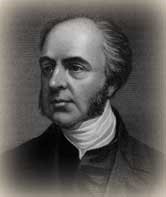









































|
| |
|
|
John Kitto D.D.
 Born in Plymouth, December 4, 1804, John Kitto was a sickly child, son of a Cornishstonemason. The drunkenness of his father and the poverty of his family meant that much of his childhood was spent in the workhouse. He had no more than three years of erratic and interrupted education. At the age of twelve John Kitto fell on his head from a rooftop, and became totally and permanently deaf. As a young man he suffered further tragedies, disappointments and much loneliness. His height was 4 ft 8 in, and his accident left him with an impaired sense of balance. He found consolation in browsing at bookstalls and reading any books that came his way. Born in Plymouth, December 4, 1804, John Kitto was a sickly child, son of a Cornishstonemason. The drunkenness of his father and the poverty of his family meant that much of his childhood was spent in the workhouse. He had no more than three years of erratic and interrupted education. At the age of twelve John Kitto fell on his head from a rooftop, and became totally and permanently deaf. As a young man he suffered further tragedies, disappointments and much loneliness. His height was 4 ft 8 in, and his accident left him with an impaired sense of balance. He found consolation in browsing at bookstalls and reading any books that came his way.
From these hardships he was rescued by friends who became aware of his mental abilities and encouraged him to write topical articles for local newspapers, arranging eventually for him to work as an assistant in a local library. Here he continued to educate himself.
One of his benefactors was the Exeter dentist Anthony Norris Groves, who in 1824 offered him employment as a dental assistant. Living with the Groves family, Kitto was profoundly influenced by the practical Christian faith of his employer. In 1829 he accompanied Groves on his pioneering mission to Baghdad and served as tutor to Groves's two sons. In 1833 Kitto returned to England via Constantinople, accompanied by another member of the Groves mission, Francis William Newman. Shortly afterwards he married, and in due course had several children.
A London publisher asked Kitto to write up his travel journals for a series of articles in the Penny Magazine, a publication read at that time by a million people in Britain, reprinted in America and translated into French, German and Dutch. Other writing projects followed, such as the Pictorial Bible (4 Vol.) and the Daily Bible Illustrations (8 Vol.), as readers enquired about his experiences in the East amidst people living in circumstances closely resembling those of Bible times. In 1844 the University of Glessen conferred upon him the degree of Doctor of Divinity. In 1850 he received a pension for life from the Government. He died on 25 November 1854 at Cannsttt in Germany, living his wife and children.
|
| |
Read the Writings by and about John Kitto
|
|
|
"Wisdom, however, we do speak, among the full-grown [teleios], wisdom,
indeed, not of this age, nor of the rulers of this age, who are to come to nought;
But we speak, Yahweh's, wisdom, in a sacred secret, that hidden wisdom,
which Yahweh marked out beforehand, before the ages, for our glory.
|

